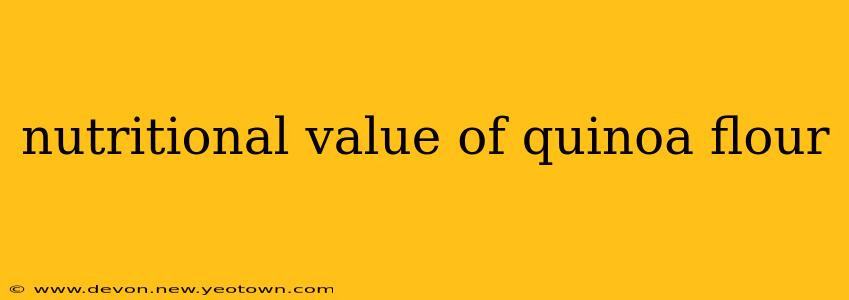Quinoa, a complete protein powerhouse, has taken the culinary world by storm. But its flour counterpart, quinoa flour, often remains somewhat underappreciated. This isn't just another grain flour; it's a nutritional powerhouse packed with benefits for your health and wellbeing. Let's embark on a journey to uncover the secrets of this incredible ingredient.
Imagine a world where your baking could be both delicious and incredibly nutritious. That’s the promise of quinoa flour. This finely ground marvel boasts a unique blend of nutrients that set it apart from other flours. Its versatility allows it to seamlessly integrate into a variety of recipes, transforming your everyday meals into wholesome feasts.
What Makes Quinoa Flour So Special?
Quinoa flour isn't just a substitute for other flours; it's a nutritional upgrade. It offers a compelling combination of protein, fiber, and essential minerals, making it a fantastic choice for health-conscious individuals. Let's delve into the specifics:
-
Complete Protein: Quinoa is one of the few plant-based sources that provide all nine essential amino acids. This means your body can readily utilize the protein from quinoa flour for building and repairing tissues. This is particularly important for vegetarians and vegans seeking complete protein sources.
-
High Fiber Content: The fiber in quinoa flour contributes significantly to digestive health. It aids in regularity, promotes a feeling of fullness, and can help regulate blood sugar levels. This is fantastic for those watching their weight or managing diabetes.
-
Mineral Rich: Quinoa flour is a good source of several vital minerals, including iron, magnesium, and manganese. These minerals play crucial roles in various bodily functions, from energy production to immune function.
Frequently Asked Questions about Quinoa Flour
Now, let's address some common questions surrounding this amazing flour:
Is quinoa flour gluten-free?
Yes! This is a significant advantage for individuals with celiac disease or gluten sensitivity. Quinoa flour is naturally gluten-free, making it a safe and delicious alternative to wheat flour.
How does quinoa flour compare nutritionally to other flours?
Compared to wheat flour, quinoa flour generally boasts higher levels of protein and fiber, and a richer mineral profile. It’s lower in carbohydrates compared to some other gluten-free flours, making it a good choice for those monitoring their carb intake. However, it's important to note that the exact nutritional values can vary depending on the processing methods and the specific quinoa variety used.
What are the potential health benefits of consuming quinoa flour?
The health benefits are numerous! The high fiber content aids in digestion and helps regulate blood sugar levels. The complete protein supports muscle building and repair. The abundant minerals contribute to overall health and well-being. Some studies even suggest that quinoa may help lower cholesterol levels.
How can I incorporate quinoa flour into my diet?
Quinoa flour is incredibly versatile! You can use it in baking, making pancakes, creating muffins, or even as a thickening agent in sauces and stews. It can be used alone or blended with other flours for a lighter texture. Experiment and find your favorite ways to enjoy its unique flavor and nutritional profile!
Where can I buy quinoa flour?
Quinoa flour is readily available in many health food stores, supermarkets, and online retailers. You might find it in the baking aisle or with other gluten-free products.
Beyond the Basics: Quinoa Flour's Potential
Quinoa flour is more than just a healthy alternative; it represents a culinary adventure. Its mild, slightly nutty flavor lends itself beautifully to both sweet and savory dishes. Experiment, innovate, and discover the unique culinary possibilities that this amazing ingredient unlocks. From fluffy pancakes to hearty breads, the world of quinoa flour awaits your exploration! Embrace the delicious and nutritious possibilities.

